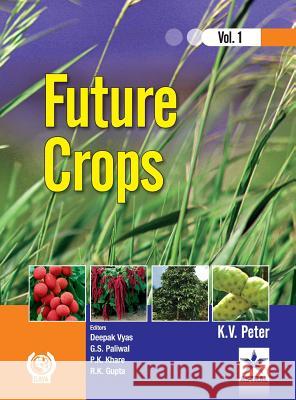Future Crops Vol 1 » książka
Future Crops Vol 1
ISBN-13: 9789351240648 / Angielski / Twarda / 2011 / 314 str.
'Science and Technology led Horticulture would lead India to meet the three of the ten Millennium Development Goals (MDG) set to achieve by 2015'; writes Dr. R.S. Paroda, Chairman, Trust for Advancement of Agricultural Sciences (TAAS) New Delhi in the Foreword to the book Future Crops. The interstate and inter country migration throws newer opportunities for type and nature of food. Rice consumption is going down in developed countries and getting reduced in developing countries. Hitherto underexploited and underutilized horticultural crops are getting attention because of their lesser water requirement, higher productivity/unit of time and space and richness in nutrients-macro, micro, antioxidants. These are time tested, region specific, consumer centered and traditional knowledge based crops. At a point of time, they were major crops got renegated to underutilized ones and now projected as Future Crops. 'The Future crops should meet future challenges in climate, policies, depleted biodiversity, newer life styles and food habits' writes Prof. H.S. Gupta, Director, Indian Agriculture Research Institute, New Delhi in his preface to the book. The first volume deals with chayote, cluster bean, date palm, grain amaranth, kair, lettuce, litchens as food, longan, noni, rambutan, saffron, spearmint and vegetable pigeon pea. Two chapters deal with threatened medicinal and aromatic plants of Mizoram and underutilized vegetables of Mizoram. By 2020 India alone requires 200 million tones of vegetables and 180 million tones of fruits to meet the nutrient requirement of 1250 million people. Climate change by 2 degree centigrade will induce early flowering and lesser yield compounded by drought and flood. Future Horticultural Crops-vegetables, fruits, tubers, plantation crops, spices, aromatic and medicinal plants, ornamentals, mushrooms, litchens etc. both terrestrial and aquatic would be the sure bet for human existence along with supporting fauna and flora. Readership: Students of Agriculture, Horticulture, Botany, Animal Sciences, Forestry, Food and Nutrition at B.Sc., M.Sc. and Ph.D. levels, nutrition experts, scientists, administrators, planners, farmers and above all nature lovers. Futurologists have a ready source of information for debate and discussion.











